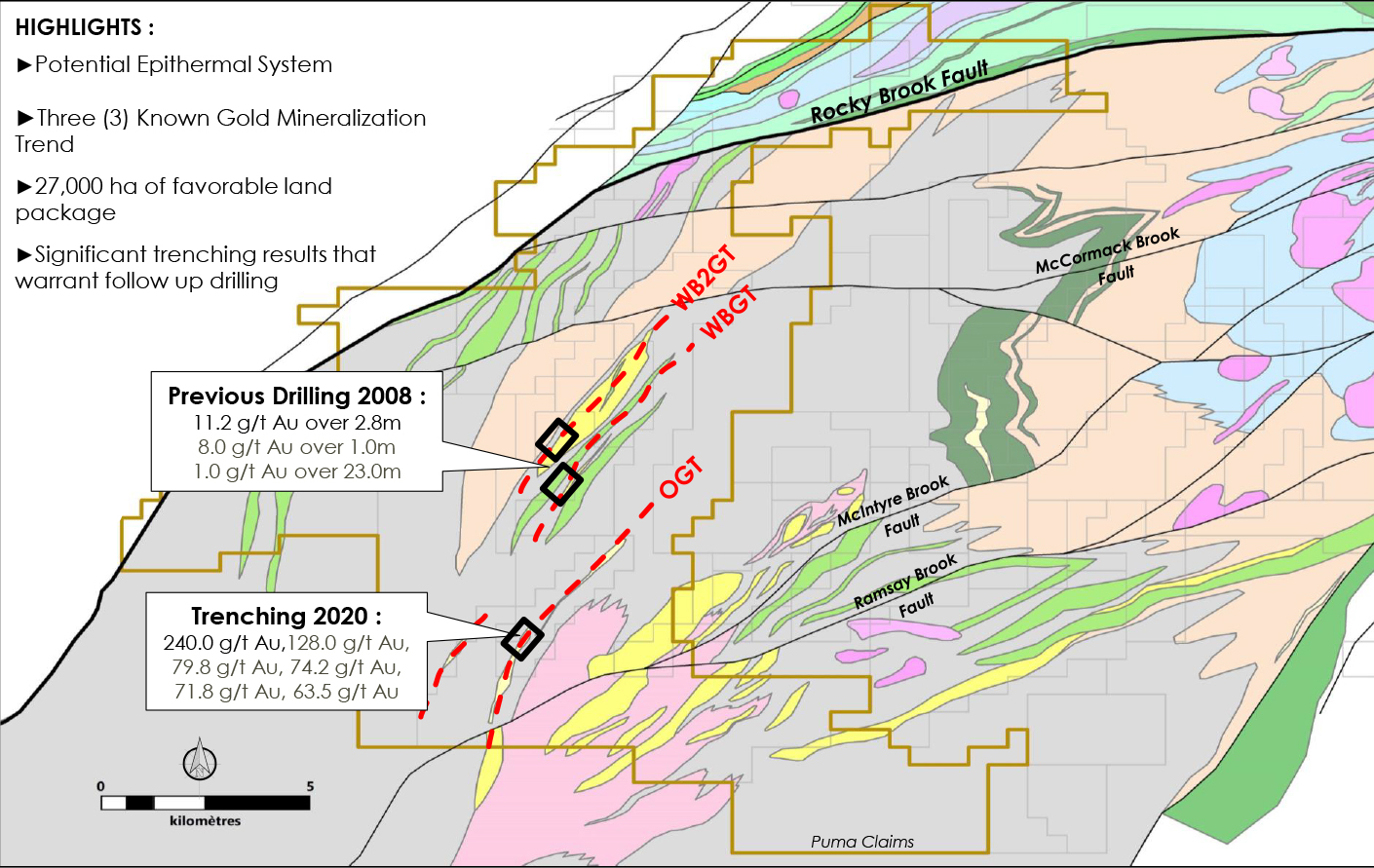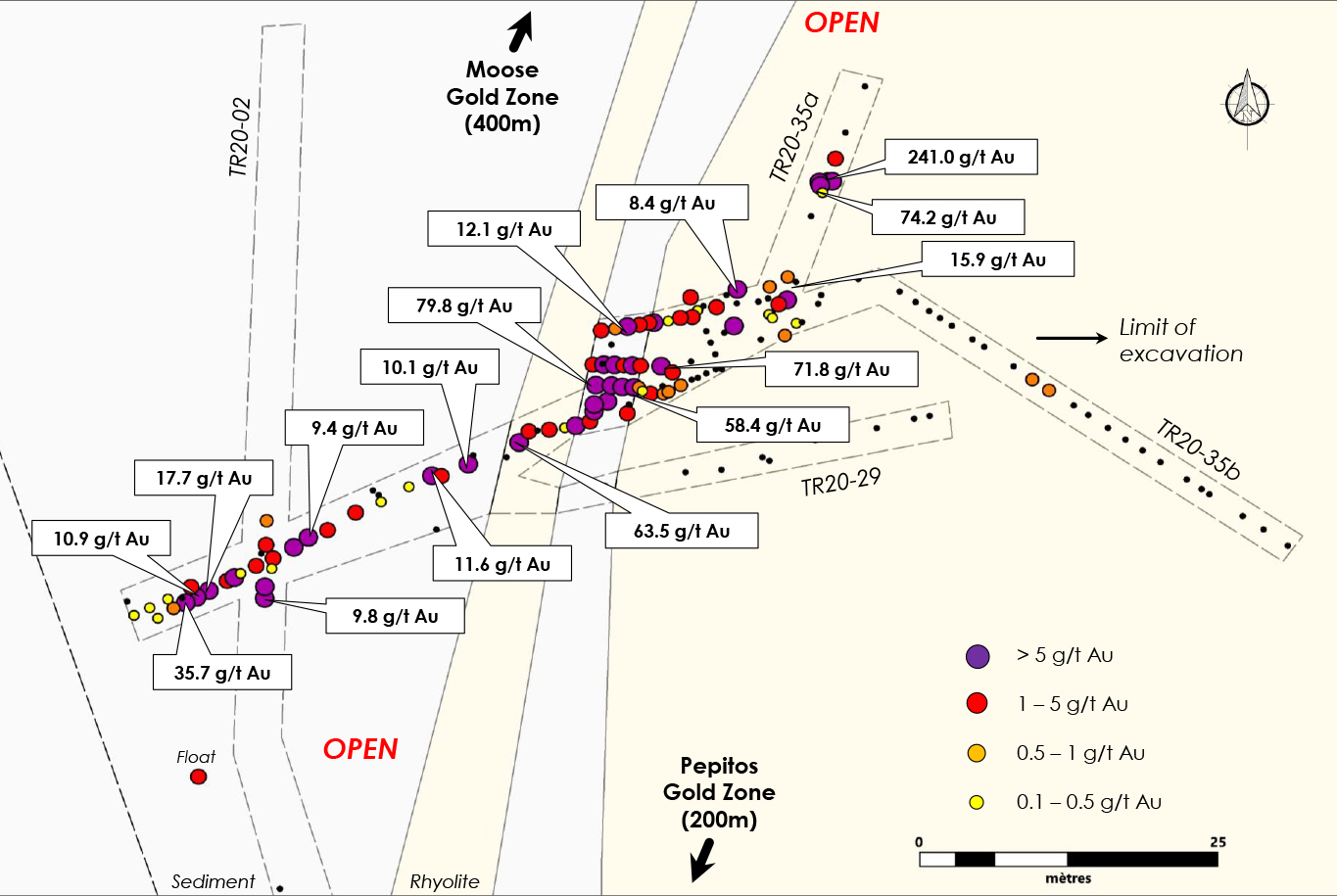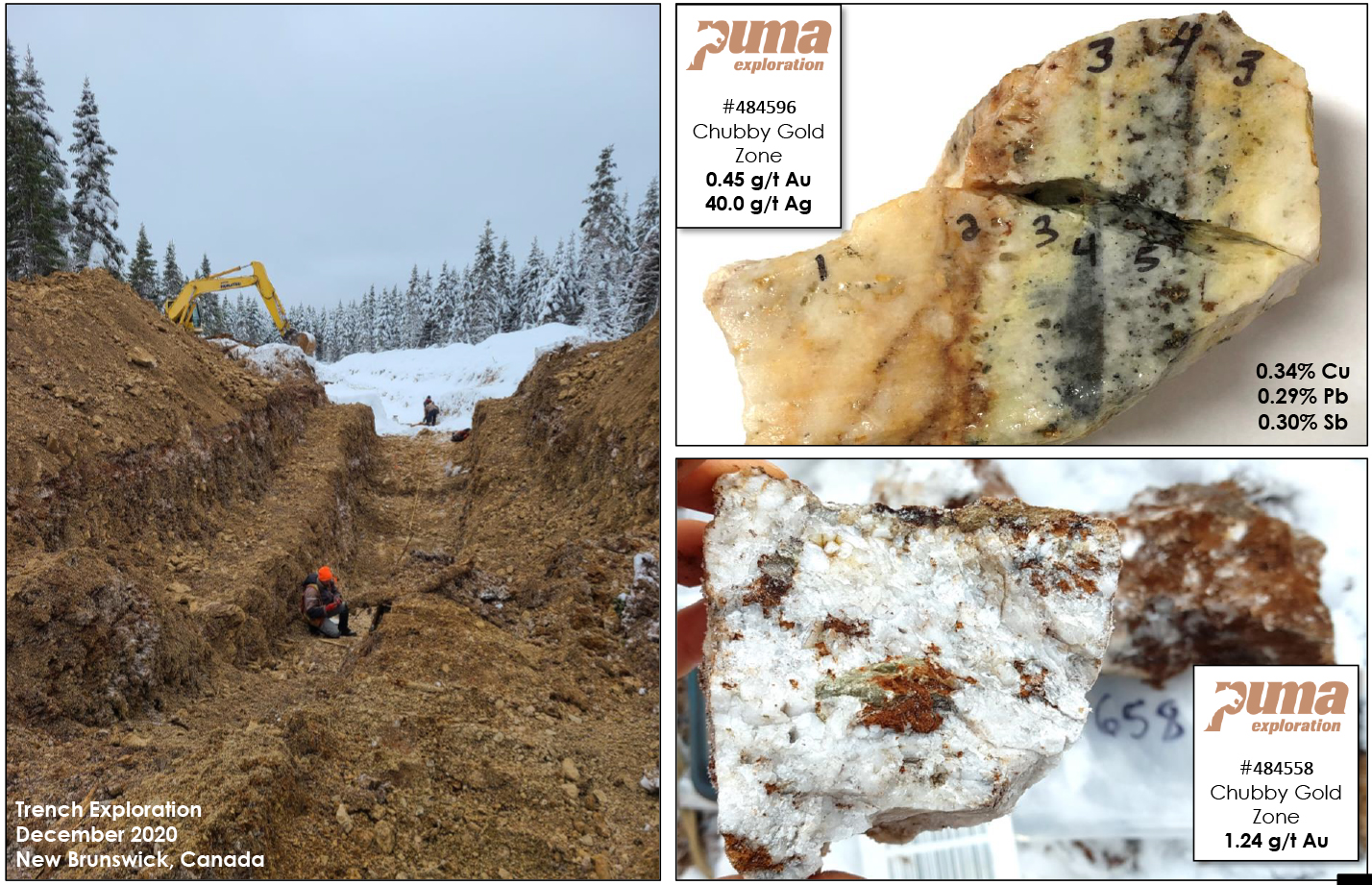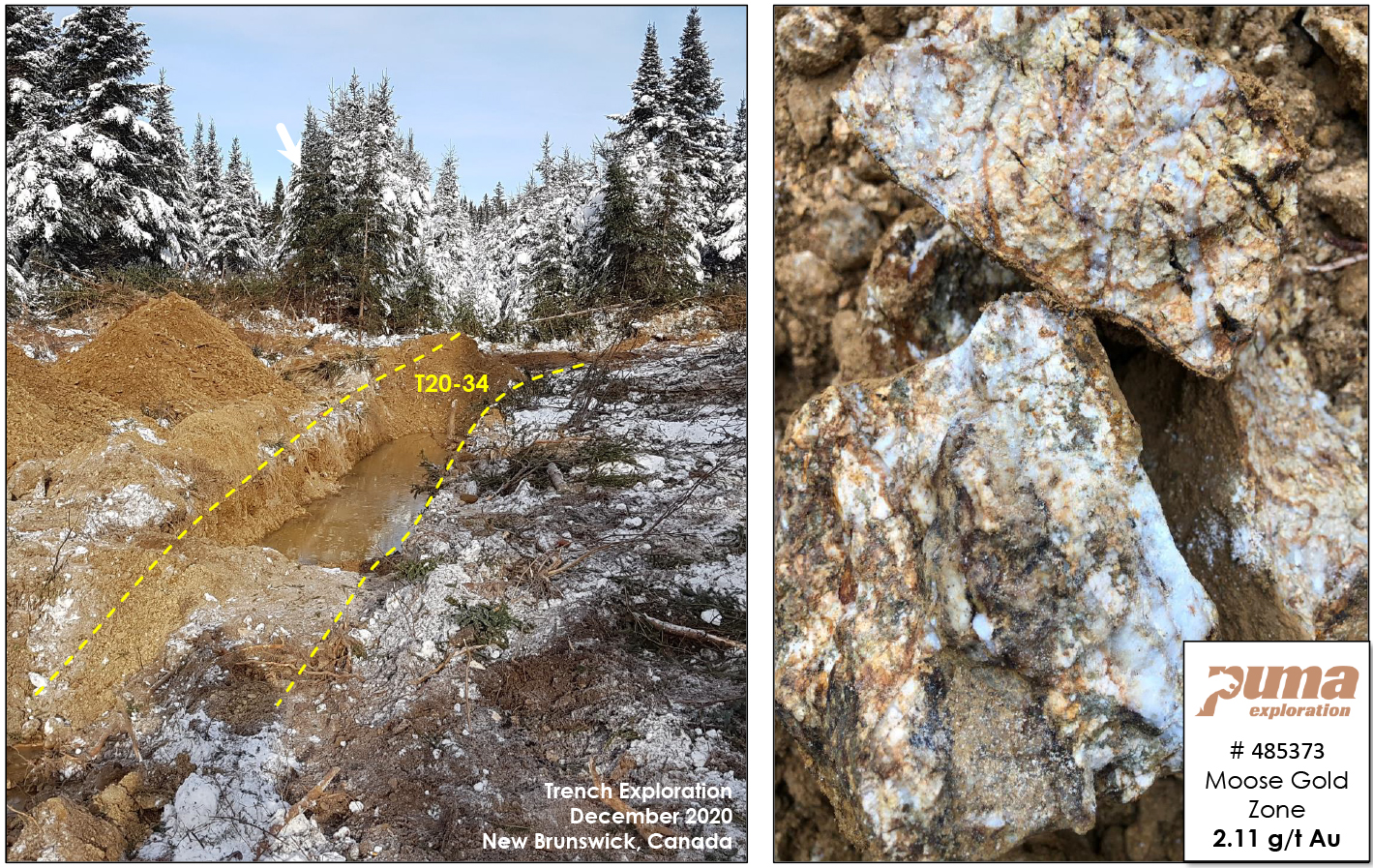Puma Makes New High-grade Gold Discoveries With Surface Sample Grading 241.0 g/t Au at Its Williams Brook Property, NB, Canada
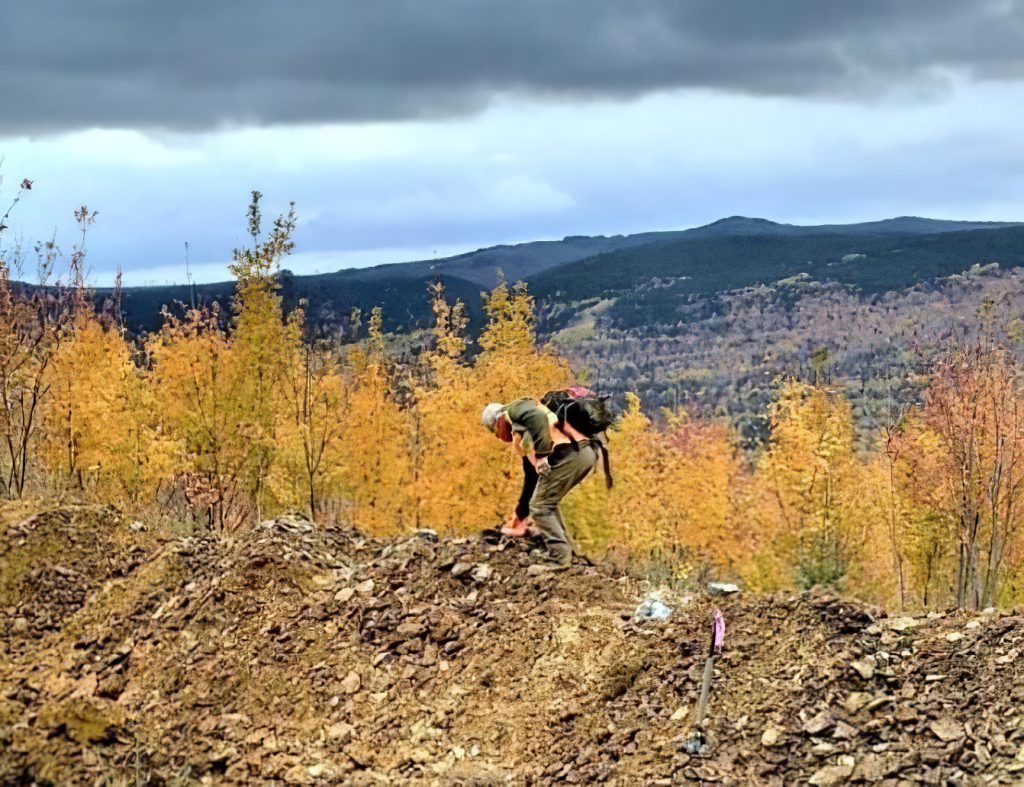
Puma Exploration Inc., [PUMA-TSXV], (the “Company” or “Puma”) is pleased to report final assays from its 2020 exploration campaign with the release today of the highest gold grade samples and additional continuous gold zone discovered, to date; with selected grab samples* of 241.0 g/t Au, 79.8 g/t Au 74.2 g/t Au at Lynx Gold Zone.
The Lynx Gold Zone, is part of the O’Neil Gold Trend (OGT), defined by trenching over 650 meters, at its Williams Brook Property (Figure 1).
HIGHLIGHTS:
- New gold discoveries from recent trenching at Lynx Gold Zone with selected grab samples* grading 241.0 g/t Au, 79.8 g/t Au, 74.2 g/t Au, 71.8 g/t Au, 63.5 g/t Au collected from bedrock.
- The Lynx Gold Zone is 75 meters long by 25 meters wide, open in all directions, and contains over 50 samples grading > 1 g/t Au.
- The Lynx Gold Zone, is located 200 meters northeast of the Pepitos and O’Neil Gold zones along strike of the O’Neil Gold Trend (OGT).
- Recent trenching operations lead to the discovery of two additional Gold Zones; the Chubby (3.5 g/t Au, 1.2 g/t Au and 1.2 g/t Au) and Moose (2.4 g/t Au, 2.1 g/t Au and 1.3 g/t Au) Gold Zones located respectively 100 meters and 400 meters Northeast of Lynx.
*Selected rock grab samples are selective by nature and may not represent the true grade or style of mineralization across the property.
The O’Neil Gold Trend (OGT), is hosting from south to north; the O’Neil, Pepitos, Lynx, Chubby and Moose, all newly discovered in 2020 by trenching and surface sampling (figure 2). The favorable rhyolite is open in both directions and the current airborne survey (90% completed) should indicate its potential size.
Marcel Robillard, President and CEO of Puma said : ” It is amazing to see that every trench excavated along the O’Neil Gold Trend (OGT) has discovered significant new gold mineralization. The discoveries of these high-grade gold zones follows over 650 meters of trenching, demonstrates the high potential for a large epithermal gold deposit at Williams Brook.”
Figure 1: Williams Brook Property and location of the 2020 Exploration program
“The recent trenching program in 2020Â (4,500m)Â highligthed many prospective areas remaining untested along the main fertile contact between the altered rhyolite and the sediment units. We are thrilled to continue the stripping operations at Williams Brook and initiate the first ever fully-fund drilling program along the O’Neil Gold Trend.” Add Marcel Robillard.
THE LYNX GOLD ZONE
The Lynx Gold Zone (Figure 3) is located 200 meters northeast of the O’Neil Gold and the Pepitos Gold Zone where high-grade gold samples were collected and assayed during the 2020 exploration and trenching program (see news released 2021-02-18, 2020-09-01). Bedrock samples grading up to 240 g/t Au at Lynx have been observed in brecciated quartz veins at the contact between the sediments and the altered rhyolite (see table 1 for gold assays). The contact sediment/rhyolite is hosting the majority of high-grade gold samples collected, so far, along the O’Neil Gold Trend (OGT). Also, Silver-Antimony and bismuth mineralization were encountered in the trenching which adding to the geological model and will be used as high-grade gold pathfinders.
Figure 2: The O’Neil Gold Trend (OGT) Main Gold Zones
Figure 3: The Lynx Gold Zone trenches resultsÂ
Table 1 : High-Grade selected grab samples (>10.0 g/t Au) at Lynx Gold Zones*
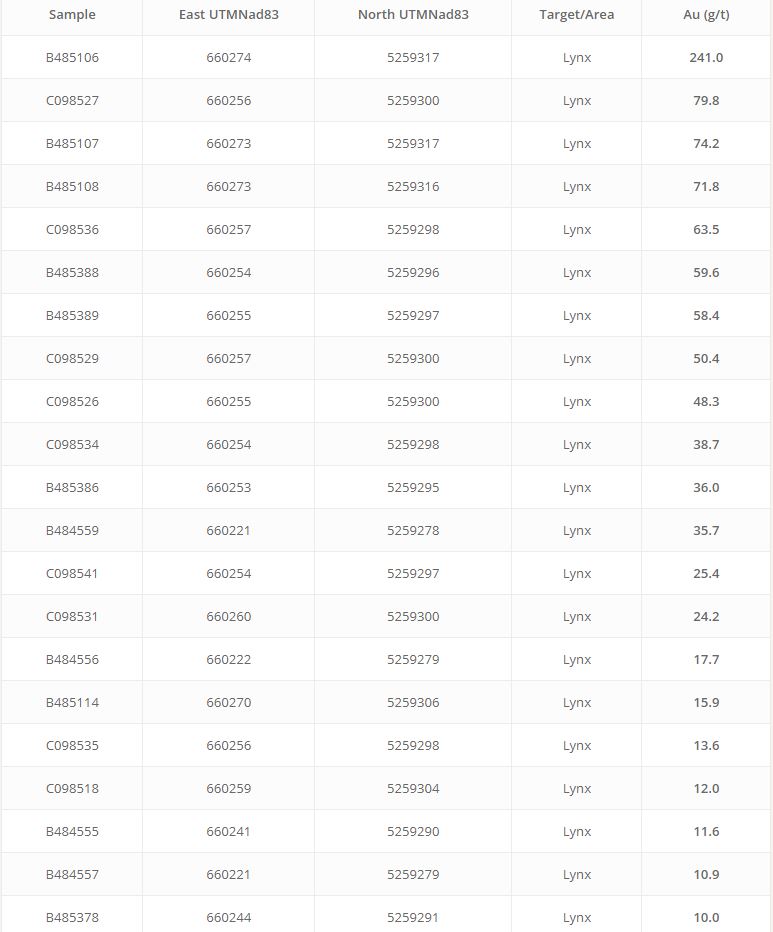
THE CHUBBY AND MOOSE GOLD ZONES
The other new discoveries; the Chubby (Figure 4) and the Moose (Figure 5) Gold zones are located, respectively 350 meters and 600 meters NE of the O’Neil Gold Zone.  The gold mineralization is located in a faulted, altered, and brecciated rhyolite. Most of the samples containing the higher grade gold mineralization show a distinctive epithermal texture and are located along the contact zone (Sed/Rhy) which represents an important control/conduit parallel to the regional structures trending NE. Potential gold enrichments systems (Riedel Type) are composed of extension veins (N290° to N320°) within the rhyolite/sediment contacts.
Figure 4: The Chubby Gold Zone
Figure 5: The Moose Gold Zone
Table 2 : Significant selected grab samples (>1.0 g/t Au) at Chubby and Moose Gold Zones*
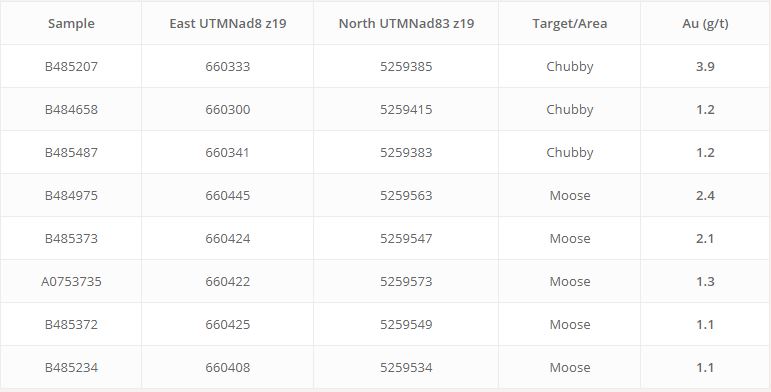
CURRENT ACTIVITIES 2021 AND PROGRAM
These impressive new results, data and interpretation will lead to the drilling target definition for the first ever drilling program along the O’Neil Gold Trend. The first step is to proceed with a major strpping area over the entire O’Neil Gold Trend (600m by 100m) where the main objective will be to better define and located the fertile contact between the sediments/Rhyolite along the OGT.
Also, the district-scale Airborne VTEM survey (3,900km) of the Triple Fault Gold Project is almost done (90%) and will help define the geophysical signature of these high-grade Gold new discoveries. Since January, Puma proceeded with significant claims addition to secure the entire Williams Brook area.
Marcel Robillard, President and CEO of Puma said: “Since less than one (1) year Puma consolidated the Triple Fault project as an emerging gold district, including all its gold showings, soil and till anomalies within the prospective area. We have been active in the area for 15 years, but 2020 was our most ambitious year with new objectives.”
O’NEIL GOLD TREND (OGT)
The O’Neil Gold Trend (OGT) is represented as a pervasive altered and brecciated rhyolite unit hosting significant gold showings and occurrences followed by trenching over a strike length of 5.0 km. The favourable unit (rhyolite) is similar and parallel to the structures hosting the “Williams 1” and “Williams 2” Gold Zones with selected drill results of 11.2 g/t over 2.8m, 2.1 g/t Au over 9.0m, and 1.0 g/t over 23m.
These trends are interpreted to be related to a major rifting in the New Brunswick Geological events and could represent a low sulphidation epithermal gold system. Along the OGT, the width of the altered horizon varies from 5 to 250 meters with an average apparent thickness of 150 meters. Numerous quartz veins, quartz veinlets, stockworks and breccias were observed mostly perpendicular to the major trend and contain the gold mineralization. The OGT has never been drilled and many gold zones were discovered during the summer 2020 exploration campaign.
TRIPLE FAULT GOLD PROJECT
The Triple Fault Gold Project includes three (3) properties named Williams Brook Gold, Jonpol Gold, and Portage Lake, covering more than 32,000 hectares of favorable gold exploration land package. The project is located about 60 km west of Bathurst with the paved road cross-cutting the property.
Puma is currently focusing its field work on its first priority, the Williams Brook Gold property. The Williams Brook Gold property includes selected drill results of 11.2 g/t over 2.8m, 2.1 g/t Au over 9.0m, and 1.0 g/t over 23m, gold occurrences grading up to 109.0 g/t Au, 50.8 g/t Au, 38,9 g/t Au in bedrock, numerous gold soil anomalies and extremely anomalous till samples with up to 508 gold grains that occur over an area approximately 12 by 3 kilometers.Â
There has been very limited drilling and exploration in the area mapped to be part of the Dunnage Zone hosting major gold deposits and gold occurrences in siluro-devonian rocks and considered as an emerging gold exploration and development district.
QUALIFIED PERSONS
Dominique Gagné, PGeo, independent qualified person as defined by Canadian National Instrument 43-101 standards, has reviewed and approved the geological information reported in this news release. Neither TSX Venture Exchange nor its Regulation Services Provider (as that term is defined in the policies of the TSX Venture Exchange) accepts responsibility for the adequacy or accuracy of this release. Mr. Gagné is independent of the Company.
QUALITY ASSURANCE/QUALITY CONTROL (QA/QC)
Rock samples were bagged, sealed and sent to the facility of ALS CHEMEX in Moncton, New Brunswick where each sample is dried, crushed, and pulped. The samples were crushed to 70% less than 2mm, riffle split off 1kg, pulverise split to better than 85% passing 75 microns (Prep-31B). A 30-gram subsplit from the resulting pulp was then subjected to a fire assay (Au-ICP21). Rock sample ICP results with gold >1g/t were subjected to a metallic screening (Au-SCR24) 1kg pulp screened to 100 microns. Other screen sizes available. Duplicate 50g assay on screen undersize. Assay of entire oversize fraction.
ABOUT PUMA EXPLORATION
Puma Exploration is a Canadian-based mineral exploration company with precious and base metals projects in early to advanced stages located in the Famous Bathurst Mining Camp (BMC) in New Brunswick, Canada. Great efforts will be made by the Company in the coming years to deploy its DEAR strategy (Development, Exploration, Acquisition and Royalties) in order to generate maximum value for shareholders with low shares dilution.
You can visit us on Facebook / Twitter / LinkedIn
Learn more by consulting www.explorationpuma.com for further information on Puma.
Marcel Robillard, President, (418) 724-0901;Â president@explorationpuma.com
Arness Cordick, Communications, (604) 341-6025
Forward-Looking Statements: This press release may contain forward-looking statements. Such forward-looking statements involve a number of known and unknown risks, uncertainties and other factors which may cause the actual results, performance or achievements of Puma to be materially different from actual future results and achievements expressed or implied by such forward-looking statements. Readers are cautioned not to place undue reliance on these forward-looking statements which speak only as of the date the statements were made, except as required by law. Puma undertakes no obligation to publicly update or revise any forward-looking statements. These risks and uncertainties are described in the quarterly and annual reports and in the documents submitted to the securities administration.

